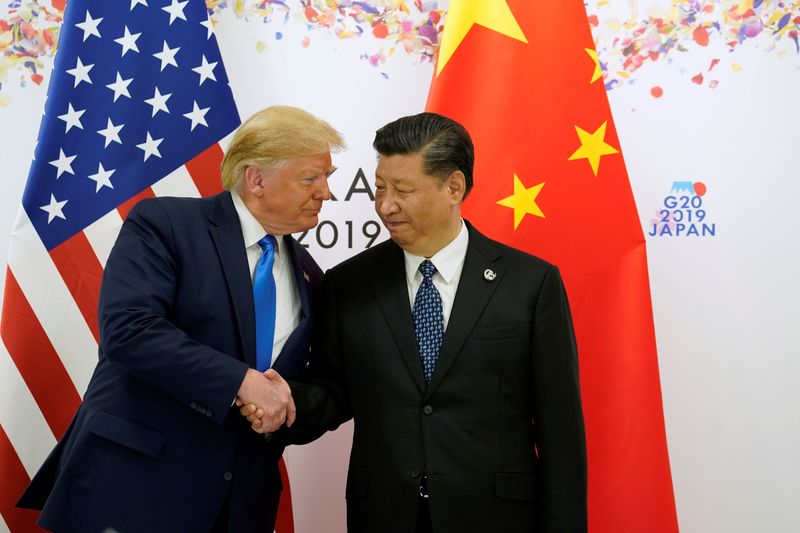By Alexandra Alper and Ross Kerber
WASHINGTON/BOSTON (Reuters) - President Donald Trump's directive barring U.S. investments in Chinese companies linked by Washington to China's military is unlikely to deal the firms a serious blow, experts said, due to its limited scope, uncertainty about the stance of the incoming Biden administration and already-scant holdings by U.S. funds.
The executive order, first reported by Reuters, was signed by Trump on Thursday as he sought to curb access by American investors to 31 Chinese firms labeled by the Pentagon as "owned or controlled" by China's military.
The affected companies included China Telecom (NYSE:CHA) and China Unicom (NYSE:CHU), which is affiliated with China United Network Communications Group Co Ltd. Their shares declined roughly 8% and 7% respectively on Friday, as investors fretted about potential grave damage to the companies, and have edged down further since.
But there were limits built into Trump's directive. The order offered the possibility of licenses to circumvent the restrictions and stopped short of "blocking" the companies, a tougher sanctioning tool that would include freezing assets and banning all transactions with Americans.
It officially goes into effect on Jan. 11. But the directive does not ban new purchases of the securities until November 2021 and allows U.S. investors to continue to own or sell shares they already hold in the targeted companies, raising further questions about its impact.
"This will likely deter investment in the companies, but is not likely to inflict the kind of critical injury, as well as unintended collateral damage, that would result from a full blocking of the companies," said Matthew Tuchband, a Washington-based attorney with the firm Arent Fox and a former Treasury Department official.
President-elect Joe Biden, who defeated Trump in the Nov. 3 election, is due to take office on Jan. 20. His administration could recalibrate relations with China.
"Some investors may hold their breath to see whether President-elect Biden will reverse or modify the course of these and other Trump-era China restrictions," Tuchband added.
Biden would have the authority to revoke or replace the order if he wanted to do so. A current U.S. official familiar with the directive's rollout, speaking on condition of anonymity, raised doubts about how strictly Biden would enforce it.
The White House declined to respond to questions about whether it planned to tighten any provisions in the order.
The directive was part of Trump's efforts to ramp up pressure on China by limiting its access to Wall Street, as relations between Washington and Beijing have soured over issues including the coronavirus pandemic and a Chinese crackdown on Hong Kong. The order was aimed at giving teeth to the Pentagon designations that were mandated by law two decades ago but not disclosed until this past summer.
Its impact also may be diminished by the fact that while hundreds of U.S. funds continue to own shares in the targeted companies, these holdings tend to be small. A top foreign holder of China Telecom, the Vanguard Total International Stock Index Fund, owned just $68 million as of Sept. 30, compared to its $400 billion in total assets.
Dave Nadig, director of research for ETF Trends that focuses on exchange traded funds, estimated that U.S. funds own about $8.2 billion worth of shares across 13 of the targeted companies, just a tiny fraction of the investor bases of the Chinese firms.
"These are companies that already have been kind of on the gray list for a lot of investors," said Judith Lee, a Washington-based trade lawyer with the firm Gibson, Dunn & Crutcher, referring to the Pentagon listing of companies as linked to China's military.
"People are still going to treat these as toxic ... but they have already diminished their holdings in these companies," Lee added.

U.S. funds, especially passive ones that follow indexes constructed by providers like MSCI Inc, could face administrative headaches if they end up selling their shares in the targeted Chinese companies. An MSCI spokeswoman said the company was monitoring the situation.